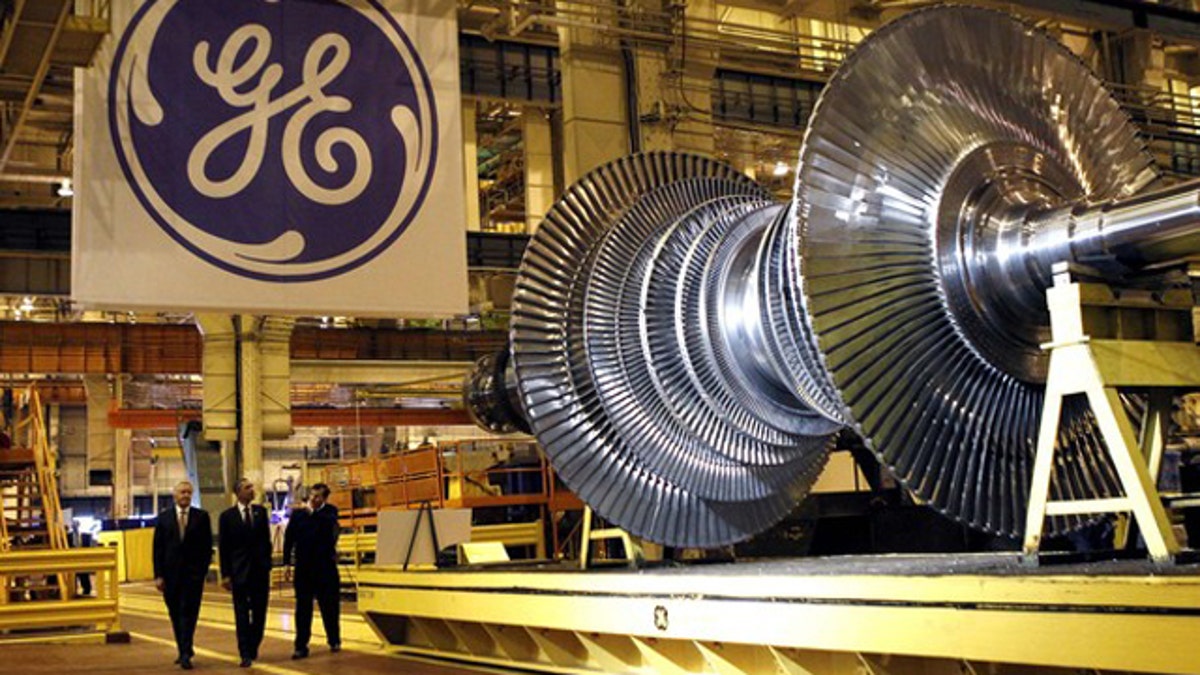
President Obama, center, passes a turbine as he tours General Electric's birthplace in Schenectady, N.Y., Jan. 21. Flanking Obama are GE CEO Jeffrey Immelt, left, and plant manager Kevin Sharkey. (Reuters)
Millions of average Americans are preparing to file their tax returns, most without the help of powerful lobbyists working to make sure the tax code is tailored to minimize their obligations to Uncle Sam. But that's exactly what many top U.S. corporations spend millions to accomplish, and it's all legal.
Although a number of the largest corporations in America are publicly taking heat for paying relatively small tax bills -- or none at all -- it's likely they're simply operating within the tax code as it now exists. General Electric is among those being singled out. Skeptics wonder how the company could report worldwide profits in excess of $14 billion -- more than $5 billion from operations here in the U.S. -- and owe nothing in taxes.
GE says it will have a "small" tax liability for 2010, but attributes that to losing "billions of dollars in GE Capital" because of the global financial crisis. Andrew Williams, GE spokesman, says the corporation is fully compliant with tax laws -- "no exceptions."
Critics say Bank of America, Boeing, Verizon and others are also benefiting from the current system: earning billions and either paying nothing or actually getting refunds. It's all a result of laws heavily influenced by Washington's top lobbyists.
Dave Levinthal, editor of OpenSecrets.org, which tracks lobbying and campaign spending, says most Americans are likely unaware of just how beneficial lobbying can be for big business.
"They can gather up incredible amounts of resources in order to lobby the White House, lobby Congress -- really cover the waterfront in terms of their political liabilities," Levinthal said.
It's no secret that GE enjoys a close relationship with the Obama administration. Earlier this year, President Obama tapped GE CEO Jeffrey Immelt to head up his Council on Jobs and Competitiveness.
Levinthal says GE is one of the best when it comes to putting together a "full frontal assault on politics in Washington." He notes that GE "has a lot of money to bring to the table" and has very powerful people working on the corporation's behalf in Washington.
But, if Obama has his way, big changes could be coming for American companies -- including GE. At a town hall meeting in Pennsylvania last week the president noted, "We have so many loopholes that it turns out you've got a whole bunch of companies who are paying no taxes or barely paying taxes or they keep their money in offshore accounts."
Obama says it's time to reform U.S. tax laws: "What you pay in taxes should not depend on how good your lawyer is."
Congress will have to be a partner in any revision to current tax law, and that could present a significant challenge for the administration. According to Levinthal, "If you have the money to go and fight these battles in Washington then you're probably going to have a lot more success getting what you want -- as far as taxation is concerned -- than the average guy sitting at home."
Even if Congress can be convinced to make real changes to U.S. tax laws, don't expect corporate tax bills to skyrocket. Eric Toder, co-director of the Urban-Brookings Tax Policy Center, said there's no "easy fix" to the dilemma.
"It's very hard in a world, which is global, for any one country to tax corporations where they have an ability to either shift where they report income or shift their residence," Toder cautions, adding, "There's no magic bullet."
The president may also find an ally in GE.
Williams calls the system "old, complex and uncompetitive." He says the law should be designed to make sure everyone pays their fair share, "including GE." Williams urges that it should also help to promote jobs and competitiveness but says, "It does the opposite today."
It remains to be seen whether this administration will find enough willing participants on Capitol Hill to bring about real, lasting change in the way U.S. businesses are taxed.




